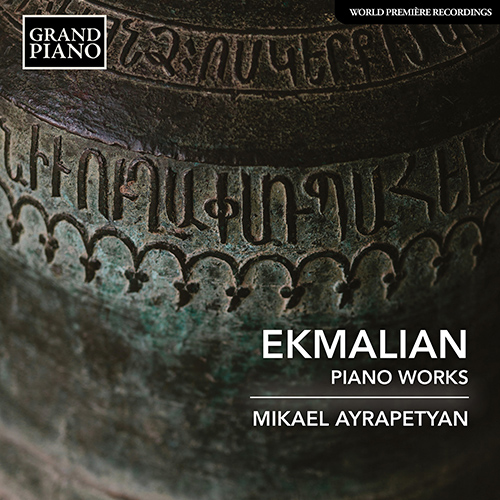
About this Release
“In my research into Armenian classical music, I have concluded that it developed from a foundation of two branches: the native folk music and spiritual music. As the first country to adopt Christianity as the state religion, Armenia has an ancient and rich heritage of sacred music. Ekmalian's work is an example of music officially canonised by the Armenian Church, which lives in the heart of every Armenian on this planet. I am happy that be able to express and share with the world the masterpieces of Patarag and folk music treatments by the genius Ekmalian!” — Mikael Ayrapetyan
EKMALIAN, MAKAR (1856–1905)
Piano Works
- Mikael Ayrapetyan, piano
Makar Grigori Ekmalian, a student of Rimsky-Korsakov, played a significant role in the development of Armenian music in the 19th and 20th centuries, expanding its genre boundaries and contributing to the formation of a new national musical language. The folk-song arrangements represent Ekmalian’s skill in blending Armenian lyrical expressiveness with European stylistic colours. His magnum opus, the Patarag (Divine Liturgy) was canonised in 1895, and is still in use by the Armenian Church today. This album of world première recordings by the acclaimed Armenian pianist Mikael Ayrapetyan are performed from the composer’s unpublished manuscripts.
This recording was made on Steinway & Sons, Model Model D. 274.
Tracklist
|
1
Nocturne () * (00:03:51)
|
|
2
Song Without Words (1888) * (00:02:12)
|
|
10 Armenian Folk Songs (1889) (00:22:00 )
|
|
3
No. 1. Heriq Ordeakq (That's enough, son) * (00:02:11)
|
|
4
No. 2. Chem krna khaha (I can't play) * (00:01:39)
|
|
5
No. 3. Pzti tha (Little boy) * (00:03:38)
|
|
6
No. 4. Baher, duq kanancheceq (Gardens, become green) * (00:03:00)
|
|
7
No. 5. Berdice dur ela, Alagyaz tesa (Coming out of the fortress, I saw Alagyaz) * (00:01:40)
|
|
8
No. 6. Hov areq, Sarer jan (Сool down, the lovely mountains) * (00:02:53)
|
|
9
No. 7. Chakharyaq (Spinning wheel) - No. 8. Zhohovrdakan (Social song) * (00:02:33)
|
|
10
No. 9. Araz e heshtacel a (Araz has become light - water) * (00:02:10)
|
|
11
No. 10. Tsamtel (Thin hair) * (00:02:11)
|
|
3 Armenian Folk Esquisses (1891) (00:08:00 )
|
|
12
No. 1. — * (00:02:12)
|
|
13
No. 2. — * (00:03:42)
|
|
14
No. 3. — * (00:01:34)
|
|
Patarag (Divine Liturgy) (arr. M. Ayrapetyan for piano) (1892) (00:40:00 )
|
|
15
No. 1. Horurd horin anhasanrskihbn (O, Deep and Incomprehensible Mystery) * (00:04:14)
|
|
16
No. 19. Surb, Surb (Saint, Saint) * (00:04:27)
|
|
17
No. 23a. Amen, Hayr erknavor (Amen, Father in Heaven) * (00:02:53)
|
|
18
No. 23b. Hoki Astuco (The Spirit of God) * (00:03:38)
|
|
19
No. 9. Marmin Terunakan (Corpus Christi) * (00:02:10)
|
|
20
No. 27. Hayr mer (Our Father) * (00:03:58)
|
|
21
No. 28. Ev end hogvo qu (Together with Your Spirit) * (00:01:07)
|
|
22
Nos. 29-30a. Miayn surb (Only Holiness) * (00:03:28)
|
|
23
No. 31a. Ter vohormya (Good Heavens) * (00:02:41)
|
|
24
No. 30c. Amen Hayr Surb (Amen, Saint Father) * (00:04:42)
|
|
25
No. 31c. Ter vohormya (Good Heavens) * (00:02:05)
|
|
26
No. 32. Orhnyal e Astuac (Blessed be God) * (00:04:10)
|
The Artist(s)
 Mikael Ayrapetyan is a pianist, composer, producer and teacher, as well as a researcher and public figure. He has done much to popularise Armenian classical music all over the world with his Secrets of Armenia musical project, which began during his studies at the Moscow Conservatory. Born in 1984 in Yerevan, Armenia, he studied at the Moscow Tchaikovsky State Conservatory, and continues to uphold the performing traditions of the Russian piano school, of which Konstantin Igumnov, Samuel Feinberg and Lev Oborin are luminaries. His repertoire ranges from the Baroque to the contemporary and includes rarely performed works by Armenian composers. This period was the start of his extensive concert activity in which he performs works by Tigranian, Chukhadjian, Komitas, Melikian, Spendiarian, Barkhudarian, Stepanian, Khachaturian, Babajanian, Arutyunian, Abrahamian, Bagdasarian, Avetisian, Mirzoyan, Amirkhanian and many other Armenian composers, which eventually led him to produce his own concerts. He was awarded the State Prize of the Republic of Armenia for his outstanding contribution to the development and popularisation of Armenian classical music.
Mikael Ayrapetyan is a pianist, composer, producer and teacher, as well as a researcher and public figure. He has done much to popularise Armenian classical music all over the world with his Secrets of Armenia musical project, which began during his studies at the Moscow Conservatory. Born in 1984 in Yerevan, Armenia, he studied at the Moscow Tchaikovsky State Conservatory, and continues to uphold the performing traditions of the Russian piano school, of which Konstantin Igumnov, Samuel Feinberg and Lev Oborin are luminaries. His repertoire ranges from the Baroque to the contemporary and includes rarely performed works by Armenian composers. This period was the start of his extensive concert activity in which he performs works by Tigranian, Chukhadjian, Komitas, Melikian, Spendiarian, Barkhudarian, Stepanian, Khachaturian, Babajanian, Arutyunian, Abrahamian, Bagdasarian, Avetisian, Mirzoyan, Amirkhanian and many other Armenian composers, which eventually led him to produce his own concerts. He was awarded the State Prize of the Republic of Armenia for his outstanding contribution to the development and popularisation of Armenian classical music. The Composer(s)
Reviews

“The interpretations have a moving character and create a very special atmosphere of well-being in the listener.” – Pizzicato

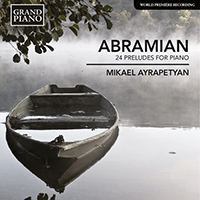
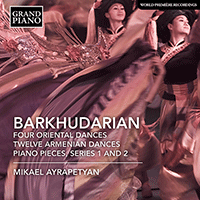
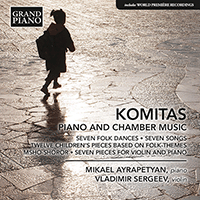
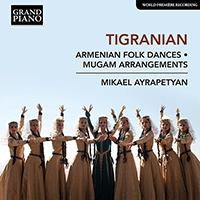
 Grand Piano has gained a reputation for producing high quality recordings of rare keyboard gems. Dedicated to the exploration of undiscovered piano repertoire, the label specialises in complete cycles of piano works by many lesser-known composers, whose output might otherwise have remained unknown and unrecorded.
Grand Piano has gained a reputation for producing high quality recordings of rare keyboard gems. Dedicated to the exploration of undiscovered piano repertoire, the label specialises in complete cycles of piano works by many lesser-known composers, whose output might otherwise have remained unknown and unrecorded.






